In June of 1976, the Bi-Centennial year, the year of every ‘Hurrah Hurrah America’ display you can imagine, the summer following my first year teaching, my friend Tony and I hitchhiked out of London to a ferry stop in Wales and on to scrofulous Dublin, across Ireland west and north, to another ferry ride, complete with Orange Day riot, to Scotland where it rained and rained, to the far north through the Highlands and finally, via bus to London in mid-August where we thought for about 10 seconds that the IRA had come knocking at the door.
I saved 9 letters and postcards from that trip, many fading photographs and an indelible sense now, a providential lifetime later, that the years from September of 1975 through the summer of 1978, those 48 months of teaching, Ireland, another cathartic journey in Montana and a final decision, settled me into a trajectory whose arc I have lived within ever since. It will take me five Posts to describe all this.
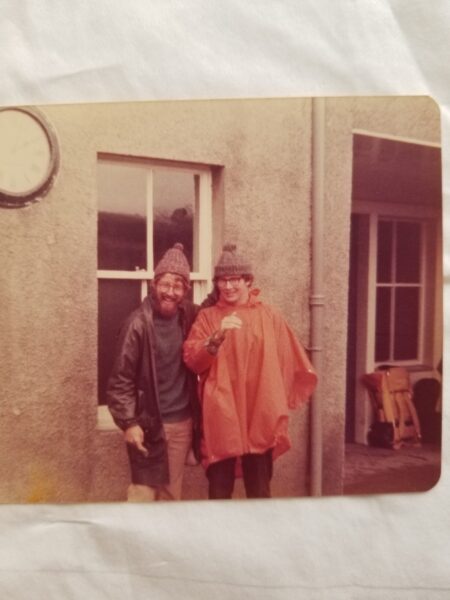 Tony*, a high school friend, had proposed that we take the summer to hitchhike all over the UK and Ireland. Most of my parents’ families had emigrated from Ireland during the Famine. I had been born and bred as an Irish American Catholic. My parents and I had watched The Quiet Man together, my mother practically fainted at the mention of JFK, and my father was the best storyteller I had ever known, a quiet man himself but a natural raconteur. Most important, the adventure implicit in the idea was an overwhelming attraction and also daunting — the two of us heading into the interior of both countries for two full months with Traveler’s Checks and our packs and everything here disappearing, especially the pressure of a wild first year of teaching. We would write letters, but no one would know where we were going; we would be out of contact with anyone at home until we hit Edinburgh in late July.
Tony*, a high school friend, had proposed that we take the summer to hitchhike all over the UK and Ireland. Most of my parents’ families had emigrated from Ireland during the Famine. I had been born and bred as an Irish American Catholic. My parents and I had watched The Quiet Man together, my mother practically fainted at the mention of JFK, and my father was the best storyteller I had ever known, a quiet man himself but a natural raconteur. Most important, the adventure implicit in the idea was an overwhelming attraction and also daunting — the two of us heading into the interior of both countries for two full months with Traveler’s Checks and our packs and everything here disappearing, especially the pressure of a wild first year of teaching. We would write letters, but no one would know where we were going; we would be out of contact with anyone at home until we hit Edinburgh in late July.
We flew out of New York on June 21 but not without drama. My name was called from a loudspeaker minutes before boarding. I ran to an airline office. The young woman I was with at the time had sent a ‘goodbye-I’ll miss you-enjoy-enjoy’ telegram*.
Our flight was an awful 13 hour marathon — a 3 hour delay on the ground; once aloft, a return to New York airspace because there was too much traffic over the North Atlantic, and finally a more circuitous route to London because the French Canadian Air Traffic Controllers were on a slowdown and refused to allow any plane to cross their territory unless the pilots spoke French.
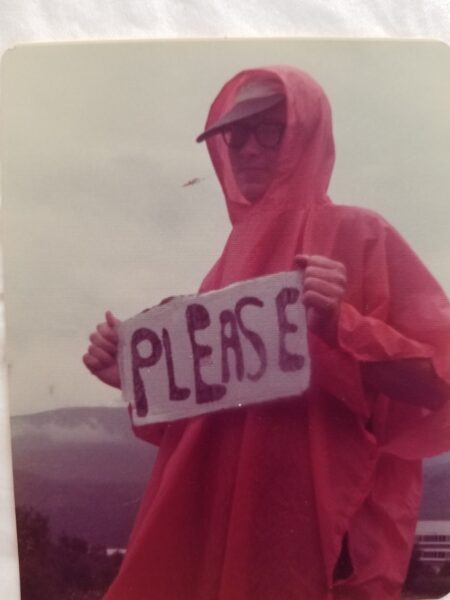 We got out of London quickly and began thumbing our way to Wales. Hitchhiking had begun to fade in the States but not so here. Throughout our journey, we never lacked for rides, and the inveterate list and record keeper I have been all my adult life, I kept track of every ride. We had 29 rides in the course of 2 months, broken only by 2 one day bus trips and one three day car rental. We gave each ride a name: Dropout Lady, Beekeeper, Sierra Leone Brains, Squeak Man, Pimp Man (I have no memory of it, but it must have been bad), Chemist Man, Lonely Girl, the Letterkenny Express, Clog Couple, English Black Mariah, Gussie O’Connor, Policeman …. Each gave us stories. Each ride took us deeper into a thrilling uncertainty.
We got out of London quickly and began thumbing our way to Wales. Hitchhiking had begun to fade in the States but not so here. Throughout our journey, we never lacked for rides, and the inveterate list and record keeper I have been all my adult life, I kept track of every ride. We had 29 rides in the course of 2 months, broken only by 2 one day bus trips and one three day car rental. We gave each ride a name: Dropout Lady, Beekeeper, Sierra Leone Brains, Squeak Man, Pimp Man (I have no memory of it, but it must have been bad), Chemist Man, Lonely Girl, the Letterkenny Express, Clog Couple, English Black Mariah, Gussie O’Connor, Policeman …. Each gave us stories. Each ride took us deeper into a thrilling uncertainty.
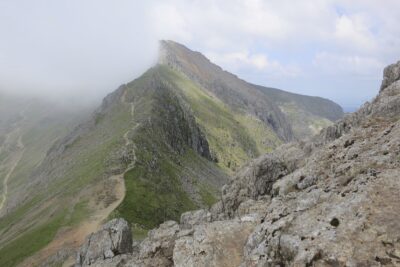 We caught rides through Birmingham and into Snowdonia National Park where we spent 2 days living out of our tent and wandering the park, including a long climb and perilous descent of Mt. Snowdon with a boy from Birmingham, Peter, who we palled with for our climb, Peter, who was going into the Royal Marines and whose Birmingham accent was so thick we had to ask him many times to repeat himself.
We caught rides through Birmingham and into Snowdonia National Park where we spent 2 days living out of our tent and wandering the park, including a long climb and perilous descent of Mt. Snowdon with a boy from Birmingham, Peter, who we palled with for our climb, Peter, who was going into the Royal Marines and whose Birmingham accent was so thick we had to ask him many times to repeat himself.
Mt. Snowdon and the trail we would have followed.
The whole first part of our trip in Wales and Ireland was all sunshine and hot weather. I burned, but we did not suffer from cold or the misery of days of rain. That came later. Snowdon is about a 3500 foot mountain, a walk-up, no gear required, but you begin from close to sea level so all those feet are hard won, but the trails are clearly marked and the view from the top is sublime. There is nothing like high country. For the first time, I understood its pull, the way it implies ecstasy.
But we cut off trail on the way down because we thought we could find a quicker way than the trail. We ended up at any number of sheer drops and then had to traverse, descend, ascend, traverse, descend, repeat. We were dehydrated by the time we stumbled back into camp. Sometimes I believe that young men are the most dim-witted of all the young of all species of mammal. Well, I was. But we walked up and down the highest peak in both Wales and the UK. Tony remembers sitting at a pub that night, a regular experience, and watching the sun set very late.
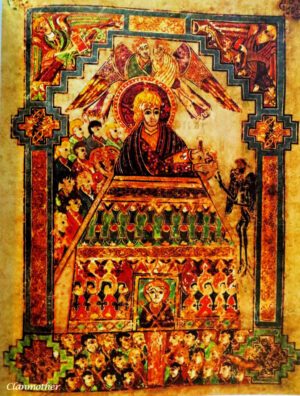 Caernarvon was a ferry stop, a way into Ireland, this three hour ride, a time to watch this spit of the Atlantic and think about Dublin and think about the West of Ireland, the green country spreading out before us, but Dublin was loud and brown and ugly and the air was brown and the Liffey brown and the city of Joyce nowhere to be found, and we stayed for one night in a cheap, stain-ridden ridden B and B, a flesh-crawling place that stayed loud deep into the night. But we did see the Book of Kells at the Trinity College Library on our way out the next day and even though all of me was in a hurry to get to the backcountry, I remember the wonderful, light-filled quiet of the Great Reading Room, so beautiful a space that even in my scruffy state, I did not feel self-conscious, and then the Manuscript pages, something of the divine that men had done.
Caernarvon was a ferry stop, a way into Ireland, this three hour ride, a time to watch this spit of the Atlantic and think about Dublin and think about the West of Ireland, the green country spreading out before us, but Dublin was loud and brown and ugly and the air was brown and the Liffey brown and the city of Joyce nowhere to be found, and we stayed for one night in a cheap, stain-ridden ridden B and B, a flesh-crawling place that stayed loud deep into the night. But we did see the Book of Kells at the Trinity College Library on our way out the next day and even though all of me was in a hurry to get to the backcountry, I remember the wonderful, light-filled quiet of the Great Reading Room, so beautiful a space that even in my scruffy state, I did not feel self-conscious, and then the Manuscript pages, something of the divine that men had done.
Hitchhiking was easiest in Ireland, and once the Irish discovered we were Americans, our welcome became warmer. We were invited in for tea and buttered bread, and we listened to stories about the Kennedy’s and their visit in 1963, months before his assassination. Again and again, above the casings of front doors and over fireplace mantels, we saw two photos, the Pope and JFK. We were encouraged to set up our tent in their fields and yards. No one was afraid of us, unkempt and tall as we were. We were Americans, closer than cousins. Americans were the western light, and we were ridiculously young and adventuring, and they loved us for it.
This is a lost time, the pre-Internet, pre-Celtic Tiger era of a shortened news cycle, no instantaneous transmissions of events, no cell phones and a poor Ireland, an Ireland almost devoid of great wealth. Then, whatever Dublin suburbs there were were so attached to the city that the transition was seamless. Within a few miles we were in an older country, green, a country of stone walls, peat fires from single, squat stone homes, one lane roads with turnarounds, and ruins — unroofed stone walls and the remains of foundations, walls with holes battered through them. In 1976 we saw the aftermath of the Famine Clearances from over 100 years in the past.
My letters to my parents were oddly formal in tone, but perhaps to keep their minds at ease, I filled them with details of rides and stories we heard and descriptions of landscapes. After I returned, my mother told me that my father had plotted our journey on several maps and talked to her about the two of them making the trip (they eventually did).
Ben Garvey, the only ride we received in all the two months where I recorded the name of the driver and his exact first words to us, took us to Ballinasloe. When we ran up to the car, Garvey said to us, ”Laddies, I couldn’t help but stop when I saw you carrying such a heavy load.”
Garvey told us that he had been a messenger boy for the IRA in Dublin in April of 1916 for the Easter Rebellion, that he served in the IRA for years and rose to a high position. He hinted at dark deeds. He said his family was 2nd cousin to the Kennedy’s and that he was a direct descendent of Hugh O’Donnell who fought English armies sent by Elizabeth I to crush Irish bids for separation.
Garvey seemed old enough, early 70’s maybe. His stories had color and drama. Tony and I could not decide on his veracity, but to listen to him was a joy.
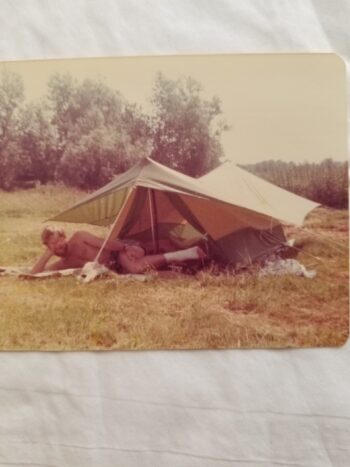 In Ballinasloe Tony cut his foot badly while we were swimming in the River Suck (yes!) and we were laid up for several days while it began to heal. He did not have to pay a penny. Wonderful socialized medicine! We stretched out in the sun and read — a biography of Babe Ruth and The Fountainhead by Rand. For a few days we made like lizards basking on a rock.
In Ballinasloe Tony cut his foot badly while we were swimming in the River Suck (yes!) and we were laid up for several days while it began to heal. He did not have to pay a penny. Wonderful socialized medicine! We stretched out in the sun and read — a biography of Babe Ruth and The Fountainhead by Rand. For a few days we made like lizards basking on a rock.
Under the pressure of memory, the rest of Ireland flows as if sung by a chorus — seamless, unbroken by days, scenes that swell into arias as I call upon them now.
We came to Doolin where we sat for hours in a pub listening to Irish music and singing and then via speedboat, not a ferry, to the Aran Island of Inishmore, and we camped in a cut-out where the road curved up and away from the coast and one fog shrouded morning, we heard a terrible wailing and out of that fog emerged a funeral procession of altar boys carrying a tall pole with a crucifix at the top and just behind them, a priest chanting prayers in Gaelic and then 6 men who carried a small coffin on their shoulders, the hunched parents and a dozen or more women in black, black shawls covering their heads and keening. They came out of the fog and climbed above us and vanished into the fog. Tony thought of the Aran’s as a “land before time”.
I attended a Mass spoken in Gaelic by the white haired priest dressed in white vestments with gold thread in a tiny white washed chapel where eastern sun and the chants and rumbling singing made all the enormous men and black shawled women look mythic, pre-20th Century, a chapel filled with archetypes.
On a hot 4th of July we were rowed via currach to a trawler for passage to Galway. We watched families swim their thoroughbreds out from the beach, boys and young girls and laughing men encouraging them, one boy going into the water to calm a frightened horse. More boys went into the water to attach the ropes and vests used to hoist the horses out of the water and swing them through a steel door opened in the side of the ship. The horses looked amazed to suddenly be in the air. A big man in a red shirt, his currach bobbing in the swell, took off his newsboy’s cap, dipped it into the sea and threw it upon his head, the water splashing and flowing down his face and shoulders. He laughed all the while in such delight.
We were heading into the North, Galway through Ballyhaunis where we were caught in a deluge and soaked through, and on to Letterkenny where at the invitation of the caretaker we stayed in an abandoned Presbyterian church, kept company by “a wee bat” who flew above our heads all night. We stayed there two days waiting out a ferocious wind and gales of rain. On to Donegal where on the advice of a journalist, our final ride until Scotland, we bought bus tickets for our trip through the Six Counties where the IRA and British Troops and Protestant Militias were engaged in a hot war of bombings and assassinations. The journalist warned us not to hitchhike in the North. The situation was too volatile. He thought our backpacks and American accents would probably give us free passage but he couldn’t be sure. I remember this very clearly, that no matter what, we were never to tell anyone our religion.
We set out to cross the Six Counties on July 11, the day before Orange Day, that most patriotic celebration for Protestants and most hated celebration by Catholics.
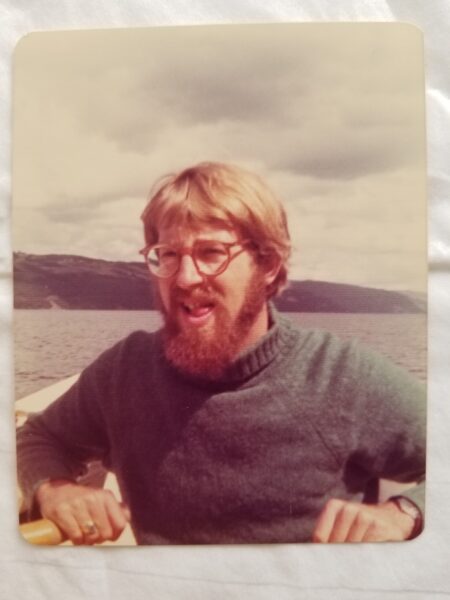 *Tony: Tony is one of the most remarkable men I know. We graduated from HS together. That’s over 50 years of friendship. He taught math in Portland OR and Cochabamba, Bolivia and later created out of his imagination and ambition, two superb charter schools in Sante Fe, NM: The Monte del Sol Charter School and The Mandela International Magnet School. And he served as headmaster at the American School in Warsaw, Poland. And he is tri-lingual — he speaks both Spanish and Polish. He is very funny, very smart and was the best traveling companion.
*Tony: Tony is one of the most remarkable men I know. We graduated from HS together. That’s over 50 years of friendship. He taught math in Portland OR and Cochabamba, Bolivia and later created out of his imagination and ambition, two superb charter schools in Sante Fe, NM: The Monte del Sol Charter School and The Mandela International Magnet School. And he served as headmaster at the American School in Warsaw, Poland. And he is tri-lingual — he speaks both Spanish and Polish. He is very funny, very smart and was the best traveling companion.
* Another in a series of relationships I screwed up because of my own immaturity and idiot insensitivity, a trend that continued until my first wife, Bernice (who later died of cancer), rescued me from myself, and my second wife, Patti, kept me (keeps me) steady and whole. Both made me a better man than I would have been without them.